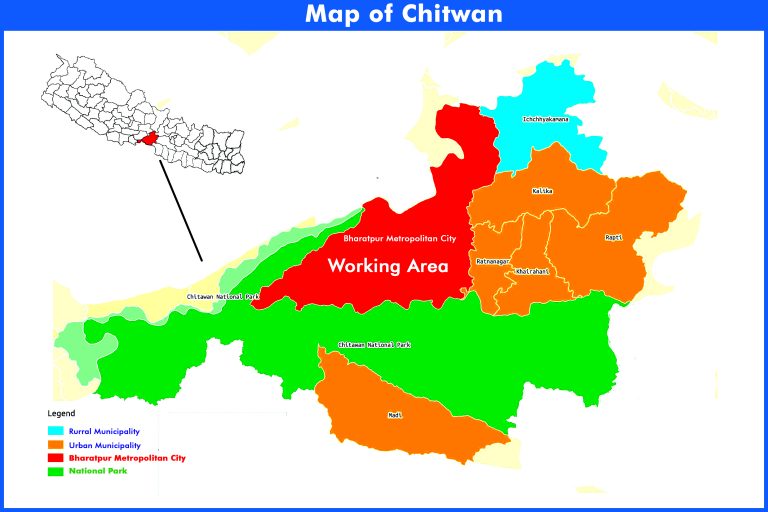1. Objectives of the project
To improve their health and environment by a proper waste management at household and small scale industrial level
The specific objectives are
2. Project area
Bharatpur Metropolitan City (BMC) is the project area, located in the central-southern part of Nepal. It lies on the left eastern bank of Narayani River. Bharatpur is the fourth largest city in Nepal, with a population of 280,502 (CBS, 2015). It is one of the fast-growing cities in Nepal generating more than 100 tons of solid waste per day (BMC, 2016).


3. Snapshot of project activities
| S.N | Activities |
|---|---|
| 3.1 | Project approval from SWC and the municipality |
| 3.2 | Kick off meeting in community (20 meetings) |
| 3.3 | Orientation in the schools (20 meetings) |
| 3.4 | Organic manure preparation training (10 meeting in 10 wards, 2 days) |
| 3.5 | Training, preparation and distribution of organic manure preparation bin (for 200 households-20 HHs in each ward) |
| 3.6 | Training on handi-craft making using non-degradable household waste (for 100 women, 5 trainings) |
| 3.7 | Baseline study to prepare report on pollution from household waste |
| 3.8 | Baseline study on industrial waste, its effects and management system |
| 3.9 | Developing local strategies for proper management of household waste |
| 3.10 | Production and distribution of IEC materials |
| 3.11 | Radio programs/videos for public awareness |
4. Benefits of the project
assist in preventing uncontrolled GHG generation and emission from waste that would have been disposed at the landfill; production of soil improver (compost) to battle soil degradation. Apart from compost, the project will reduce methane emissions by diverting high organic waste from dumping at a riverside landfill (where the anaerobic process occurs) to a household level composting plant (aerobic process). It also reduces the amount of wastes that could end up in local drinking and agricultural water. It minimizes unwanted growth of weeds in canals and agricultural fields.
commercial composting on this scale is a new micro industrial activity for Nepal that helps in the replacement of imported chemical fertilizers by locally produced compost. It also reduces the extra cost that can incur to purify the water for household purposes.
jobs for locals by compost preparation and kitchen/rooftop gardening in particular for housewives, and staff training to improve the skills of locals.
Help to reduce infectious diseases that would result from exposure to wastes, improve drinking water quality, and improve nutrition by higher yields due to better fertilizing.
5. Collaborators


International Center for Occupational Safety and Health, Environment and Public Health (ICOEPH)


Civil Society in Development (CISU)


Bharatpur Metropolitan City (BMC) and ward offices (1-10)
He is a Civil Engineer by profession with Master’s Degree in Business Administration (MBA) and more than seven years of experiences working in the field of WASH, Hi-tech Agriculture and Urban Environmental Improvement projects. He has been leading the Composting and Recycling project (CAR) in Chitwan as the program coordinator and believes that waste issues needs to be addressed with collaborative approaches by developing sustainable waste management systems, involving the public, private, and community sectors. Besides, he is a youth activist advocating for social change through Better Chitwan Campaign.